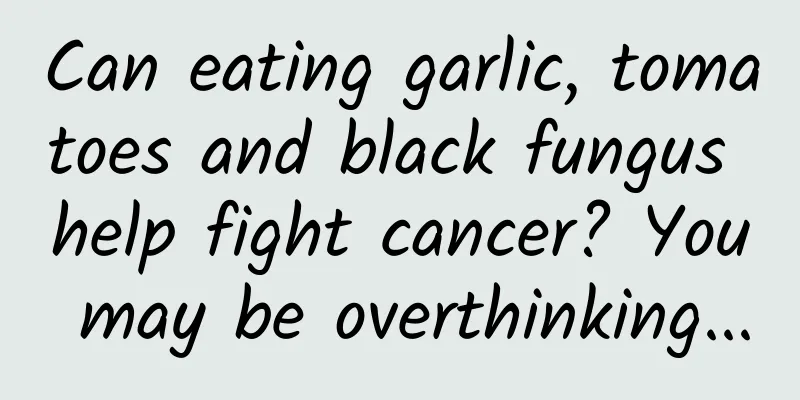Can eating garlic, tomatoes and black fungus help fight cancer? You may be overthinking...

|
Rumor : "Certain food ingredients can fight cancer" On the Internet, various anti-cancer recipes can be found everywhere. For example, eating purple sweet potatoes to fight against cancer, eating garlic to fight against cancer, eating tomatoes to fight against cancer, eating black fungus to fight against cancer... Various anti-cancer food lists and notes are also flying all over the Internet, attracting many people to follow suit. Rumor analysis : This statement is debatable. Eating only a single food or a single food ingredient cannot prevent or fight cancer. The current claim that a single ingredient or a single food can fight cancer is only a primary cell experiment, which is very different from the human body. Moreover, the human body is a complex organism, not a simple chemical reaction container. Moreover, the experimental dose is also very different from the amount of people's daily diet. When it comes to cancer, many people will be very nervous, and more and more people also hope to prevent cancer. On the Internet, various anti-cancer recipes can be found everywhere, such as eating purple sweet potatoes to prevent cancer, eating garlic to prevent cancer, eating tomatoes to prevent cancer, eating black fungus to prevent cancer... Various anti-cancer food lists and notes are also flying all over the Internet. However, are there really foods that can prevent cancer? What and how to eat can prevent cancer? Are there foods that fight cancer? In fact, eating only a single food or a single food ingredient cannot fight or prevent cancer. At present, there are indeed many studies showing that many so-called anti-cancer foods do contain some ingredients that are good for health, such as anthocyanins, flavonoids and other antioxidants, vitamins and minerals in vegetables and fruits. In cell experiments, scientists have indeed found that some ingredients can delay or even inhibit the growth of cancer cells. However, there is still a long way to go before it can be proven to be effective against cancer. After all, this is just a primary cell experiment, which is very different from the human body. First of all, the human body is a complex organism, not a simple chemical reaction container. Our body is a very complex organism, and the food we eat every day will undergo a variety of biochemical reactions. However, these reactions in the human body are much more complicated than cell experiments in test tubes. After all, the body is not as simple as simple chemical reactions. Secondly, there is a big gap between the experimental dose and the amount people eat in their daily diet. In the experiment, we used a large amount of purified ingredients for the experiment, but it is difficult for people to eat such a dose in their daily diet. If you want to eat the amount used in the experiment, you will definitely die from eating normally. In general, based on current research, a single food or food ingredient cannot prevent cancer. How to eat to reduce cancer risk? Since it is impossible to verify the effects of a single food or a single ingredient, scientists try to focus their research on one type of food, such as vegetables, fruits, beans, meat and other different foods. There are a lot of studies in this area. Current nutrition science believes that a healthy, balanced diet can reduce the risk of cancer. The most basic principle is to eat a variety of foods that contain a variety of nutrient-dense foods. Copyrighted stock images, no reproduction is authorized A healthy dietary pattern should include vegetables, fruits, grains, dairy products, and protein-rich foods. Vegetables, such as dark green vegetables, red and orange vegetables, legumes (green beans and peas), starchy vegetables (lotus root, potatoes, yams), etc. Frozen vegetables are also OK. · Fruit, especially whole fruit. · Cereals are actually what we often call staple foods. We should eat less refined grain staple foods such as white rice and white steamed bread. At least half of them should be whole grains. Dairy products, including skim or low-fat milk, yogurt, cheese, etc. Protein-rich foods, including seafood, lean meat and poultry, eggs, legumes (beans and peas), and nuts. In addition, eat less high-fat, high-sugar, and high-salt foods, and less refined grains and processed meat products. How to reduce the risk of cancer? The World Health Organization believes that one-third of cancers are preventable. How can we reduce the risk of cancer? The latest report released by the World Cancer Research Fund (WRCF) - "Diet, Nutrition, Physical Activity and Cancer: A Global Perspective" gives 10 cancer prevention suggestions and believes that as long as these 10 points can be followed, the risk of cancer can be reduced by 40%. The suggestions include: 1. Maintain a healthy weight Obesity is closely associated with 12 types of cancer, including liver cancer, ovarian cancer, prostate cancer, stomach cancer, oral and pharyngeal cancer, colon cancer, breast cancer, gallbladder cancer, kidney cancer, esophageal cancer, pancreatic cancer and uterine cancer. Therefore, maintaining a healthy weight should be the most important part of cancer prevention. 2. Maintain moderate activity Physical activity (moderate or vigorous intensity) not only prevents the risk of colon cancer, breast cancer and endometrial cancer, but also helps prevent excessive weight gain and reduces the risk of obesity-related cancers. The World Health Organization recommends that adults perform at least 150 minutes of moderate physical activity or at least 75 minutes of vigorous exercise per week. Moderate-intensity activities include: walking, housework, gardening, swimming, dancing, etc. Copyrighted stock images, no reproduction is authorized 3. Eat whole grains, vegetables, fruits, and legumes Eating whole grains can prevent colorectal cancer, and eating foods containing dietary fiber can prevent colorectal cancer and obesity. The intake of vegetables and/or fruits can also help prevent some other cancers. Don't just eat refined staple foods such as white rice and white steamed bread every day. Eat more whole grains and coarse grains. Eat at least 300-500 grams of fresh vegetables and 200-350 grams of fruits every day, especially green leafy vegetables. At the same time, eat fruits of different colors, whole grains, and beans such as lentils. 4. Eat less high-sugar, high-fat and Foods high in fat and sugar can lead to weight gain, overweight and obesity, which in turn can lead to many cancers caused by obesity. You should eat less of them. 5. Limit red and processed meat Processed meat increases the risk of colorectal cancer, Cantonese salted fish increases the risk of nasopharyngeal cancer, and foods preserved by pickling increase the risk of gastric cancer. In addition, processed meat is usually high in salt, which also increases the risk of high blood pressure and cardiovascular disease. 6. Drink less sugary drinks Sugary drinks have a high energy content. Drinking a lot of them regularly will increase the risk of obesity and related cancers. You should try to drink less or no sugary drinks. It is best to drink water or unsweetened drinks, such as unsweetened tea or coffee. If you really want to drink, pay attention to controlling the daily sugar intake to no more than 50 grams. 7. Drink less or no alcohol Alcohol is associated with the development of many chronic diseases, including cirrhosis of the liver, infectious diseases, cardiovascular disease, and the risk of several types of cancer. Copyrighted stock images, no reproduction is authorized 8. Dietary supplements are not recommended for cancer prevention Dietary supplements are also one of the health foods that we often talk about, such as common vitamins, minerals, etc., and various health foods that are advertised as anti-cancer. They are often single nutrients with high doses. Eating a lot for a long time will not help prevent cancer, and may even increase the risk of certain cancers. For example, studies have found that high-dose beta-carotene supplements may increase the risk of lung cancer in some people. 9. Breastfeeding Breastfeeding is good for both mother and baby. Breast milk provides a complete source of nutrition for newborns and young children. Breastfeeding protects the development of a child's immune system and protects against infections during infancy. The risk of asthma and type 2 diabetes is also lower in childhood and adulthood. In addition, for children, breastfeeding reduces the risk of being overweight or obese, reduces the mother's risk of breast cancer, and promotes healthy growth in babies. 10. Strictly follow your doctor’s advice after cancer diagnosis Cancer survivors are people who have been diagnosed with cancer, including those who have recovered from the disease. All cancer survivors should receive nutritional care and physical activity instruction from a trained professional. Unless otherwise recommended, all cancer survivors are advised to follow cancer prevention recommendations as much as possible after the acute treatment phase, if they can. Looking in the mirror of rumors The results obtained from cell experiments and laboratory conditions do not represent the results directly affecting the human body. Whenever you see the results obtained from cell experiments and laboratory conditions, you must be cautious, as this is a hotbed for rumors. References [1]AICR's Foods that Fight Cancer™ and Foods to Steer Clear Of, Explained https://www.aicr.org/cancer-prevention/food-facts/ ↑ [2]Does eating a healthy diet reduce my risk of cancer? https://www.cancerresearchuk.org/about-cancer/causes-of-cancer/diet-and-cancer/does-having-a-healthy-diet-reduce-my-risk-of-cancer ↑ [3]Key TJ, Bradbury KE, Perez-Cornago A, Sinha R, Tsilidis KK, Tsugane S. Diet, nutrition, and cancer risk: what do we know and what is the way forward? BMJ. 2020 Mar 5;368:m511. doi: 10.1136/bmj.m511. Erratum in: BMJ. 2020 Mar 11;368:m996. doi: 10.1136/bmj.m996. PMID: 32139373; PMCID: PMC7190379. ↑ [4]Rock CL, Thomson CA, Sullivan KR, Howe CL, Kushi LH, Caan BJ, Neuhouser ML, Bandera EV, Wang Y, Robien K, Basen-Engquist KM, Brown JC, Courneya KS, Crane TE, Garcia DO, Grant BL, Hamilton KK, Hartman SJ, Kenfield SA, Martinez ME, Meyerhardt JA, Nekhlyudov L, Overholser L, Patel AV, Pinto BM, Platek ME, Rees-Punia E, Spees CK, Gapstur SM, McCullough ML. American Cancer Society nutrition and physical activity guideline for cancer survivors. CA Cancer J Clin. 2022 May;72(3):230-262. doi: 10.3322/caac.21719. Epub 2022 Mar 16. PMID: 35294043. ↑ [5]Kerschbaum E, Nüssler V. Cancer Prevention with Nutrition and Lifestyle. Visc Med. 2019 Aug;35(4):204-209. doi: 10.1159/000501776. Epub 2019 Jul 23. PMID: 31602380; PMCID: PMC6738231.https://www.aicr.org/cancer-prevention/food-facts/↑ Author: Ruan Guangfeng, Deputy Director of Kexin Food and Health Information Exchange Center Review丨Zhang Yu, researcher/PhD, Chinese Center for Disease Control and Prevention, national health science expert |
<<: It is said that this is the evil-repelling beast that feeds on copper and iron!
>>: HD, UHD, 4K, 8K... How do you differentiate between these resolutions?
Recommend
How to use air conditioning to keep cool and save electricity? Here comes the truth!
High temperature mode is gradually being turned o...
Take stock of the brand marketing strategies spawned by anxiety!
• Introduction• The tiny cracks in human nature a...
The eternal law of Internet thinking: content + terminal
Last week, the investigation of LeTV's set-to...
What about the big upgrade of iMessage in iOS 8? Tencent has no pressure
Although no hardware products were released at tod...
The Ice Giant Arrives: A Giant Comet from the Oort Cloud
Comets are like lonely believers on a pilgrimage,...
It is said that bread has high energy, but these 4 types of bread have lower energy than steamed bread
□ Gu Chuanling Friends in the north who are tired...
Modularity and AR phones: Did Lenovo bet on the right trend?
Not long ago, Lenovo held the Tech World Technolo...
Help you quickly understand the entire UI design process in 3 minutes
Preface “Design is innovative”; “Design is honest...
Category strategy: the magic weapon to make the brand occupy more than 70% of the category's profits
This article elevates classification to a strateg...
International Rabbit Day | Rabbits have red eyes? Do they love carrots? Actually…
The fourth Saturday of September every year is In...
iOS 13 Beta 4: 5 new changes worth noting
Apple has released the fourth iOS 13 developer be...
After more than ten years, the Three Gorges Dam is still as solid as new. What’s the secret?
What is the largest hydroelectric project in the ...
Which one has more potential in the 1,000 yuan market? R9 370X vs. GTX 950
For graphics card manufacturers, the 1,000-yuan m...
Spring marketing, advanced branding strategies!
The annual "Spring Limited" marketing c...
Smart autumn harvest | Identify compound fertilizers and distinguish true from false at the speed of light
Produced by: Science Popularization China Author:...









